Dear Friends & Supporters,
As you know, WRI’s Coolfood initiative helps cities, hospitals, restaurants, universities, corporate canteens, and other food providers create dining opportunities that make it easier for people to choose healthy, low carbon menu items. We combine deep environmental research with expertise in behavioral science and consumer marketing techniques, all in a one stop shop for the food and beverage industry.
This summary looks at Coolfood’s progress in 2024, as well as who are some of the leaders in the movement for healthy, sustainable meals and why this work matters so much.
It was a big year. We released industry-leading research. We hosted our first European Summit in the great food city of Copenhagen. We were honored to partner with many organizations, including the Culinary Institute of America, the Menus of Change University Research Collaborative, Healthcare Without Harm, Nourish, Global Sustainable Hospitality Alliance, and others – and we celebrated being selected as a finalist for the previous year’s Food Planet Prize.
As we look to 2025, you can expect Coolfood to hone in on:
- Further scaling our work with food providers whose businesses (and emissions) are bouncing back from a significant slow-down during the pandemic;
- Helping more food providers utilize behavioral science techniques to engage diners in choosing low carbon foods; and
- Developing further partnerships and sharing examples of best practice from Coolfood members.
As always, thank you to the many organizations that support and work with Coolfood in the movement for healthy, sustainable meals. As you will see below, your leadership is making a real difference.
Jenny Arthur
Head of Coolfood, World Resources Institute
At a Glance
*This figure represents progress by members which have signed onto Coolfood’s science-based target, the Coolfood Pledge, before 2023. More information here.
Industry-Leading Insights
WRI is widely respected for its rigorous, peer-reviewed environmental and behavioral science research. As an initiative of WRI, Coolfood helps our members put insights from this research into action.
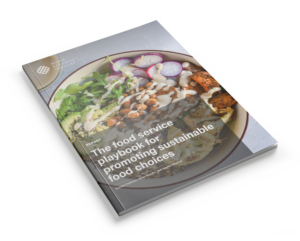 The Food Service Playbook for Promoting Sustainable Food Choices
The Food Service Playbook for Promoting Sustainable Food Choices
WRI’s behavioral scientists released new findings into how the food service industry can sell more low-carbon menu items. The research is informed by nearly 350 academic trials and a close collaboration with a range of food businesses. Coolfood helps our members put our list of 90+ behavior change techniques into action through conversations with our behavioral scientists, bespoke workshops tailor-made for members’ unique needs, and more.
Tangy, Smoky Menu Language Spices Up the Appeal of Sustainable Dishes
After Sodexo adopted descriptive dish names (like Sweet and Smoky Tacos) that Coolfood proposed to emphasize tastiness over the fact the meal is plant-based, consumer likelihood to buy the plant-based dishes doubled.
Sodexo has integrated this and other strategies from our Food Service Playbook into its Menu Language Toolkit that is used by its chefs and operational staff globally, and clients are seeing results. One of Coolfood’s most successful members, New York City, has already surpassed the target of reducing food-related emissions by 25% across city agencies, and over 36% in NYC Health + Hospitals. This success was partly possible because of a collaboration between New York City’s Office of Food Policy, nonprofit partner Greener by Default, and food service providers like Sodexo to integrate WRI’s behavioral science research into their operations.
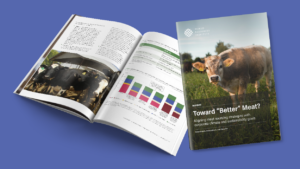 Is there Such a Thing as Better Meat? It’s Complicated
Is there Such a Thing as Better Meat? It’s Complicated
When considering the links between livestock production, society and the environment, trade-offs abound. WRI released research and recommendations on how to understand and weigh those trade-offs.
One finding: Options such as organic and grass-fed meat — which can improve animals’ lives and reduce antibiotic usage, among other benefits — often come with higher GHG emissions and environmental impacts than conventionally produced options. Read our Insights Article to learn more.
As a next step, Coolfood is working with a leading contract caterer to assess beef suppliers and their products against a range of environmental metrics and other values (e.g., animal welfare, antibiotic use), and identify opportunities for companies to purchase beef that is produced more sustainably. We hope to make resources resulting from this research available for all companies in the future.
Sector Insights
Each year we report the collective progress of over 70 hospitals, cities, restaurants, catering companies and other food providers that have committed to the Coolfood Pledge, a science-based target to reduce food-related emissions by 25% by 2030. Here, we look at examples of the changes happening across a range of sectors working with Coolfood.
Cities Take a Bite Out of Climate Change
Cities are vibrant hubs for dining out – in schools, senior homes, municipal buildings, and more. Coolfood is honored to work with the cities of Copenhagen, Ghent, Greater London Authority, Madrid, Milan, New York, Toronto, and Washington, D.C. to lower their food’s climate impact.
Our most recent data show that city members have reduced the share of beef and lamb served per plate by 65% and the share of other animal-based foods by 22%. At the same time, our city members have increased the share of plant-based foods on the average plate by 21%. Together, these changes have led to an overall reduction in per-plate emissions of 40%!
Coolfood hosted its first European Summit in Copenhagen – one of four member cities to have now surpassed the 2030 emissions reduction target. The event had a special focus on ways that cities and the private sector can work together to reduce emissions. Read more about the two-day Summit here.
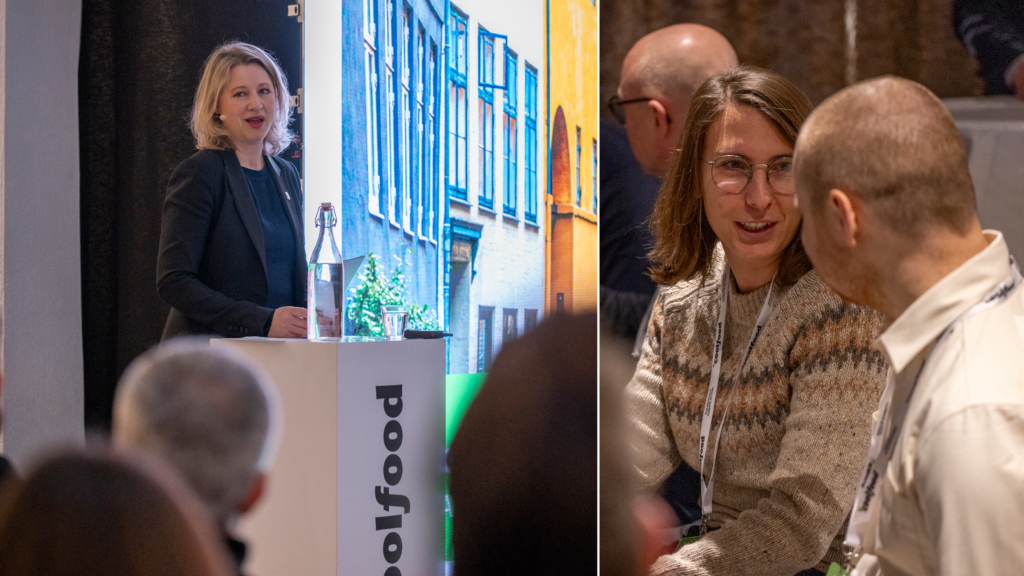
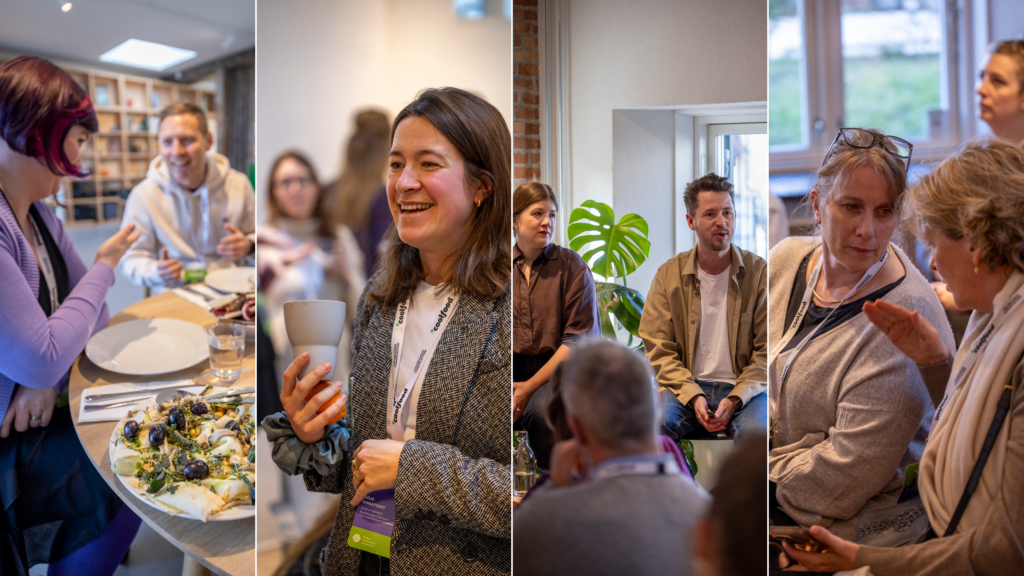
Because school meals make up the majority of meals served by Coolfood Pledge member cities, school cafeterias are an important place for education about healthy and sustainable diets.
Copenhagen is a great example of city action, having utilized a variety of strategies – from teaching school children about plant-based foods to contracting with celebrated chefs to create delicious food offerings.
In Milan, schoolchildren are among the many residents tasting the change. In WRI’s Food Service Playbook for Promoting Sustainable Food Choices, we identified 18 no-regret behavior change strategies that cities and other food providers can use to introduce and normalize healthy and sustainable plant-based meals for kids. Milan used one such strategy – using plant-based ingredients in traditionally meat-based dishes – when it made all of the Bolognese sauce served in schools plant-based. Bolognese sauce is traditionally made with beef, a resource-intensive food to produce.
In Ghent, chefs from the city’s catering company receive ongoing training to create innovative dishes for school children. The city tries out specially designed dishes with legumes, taste tests them, then puts the recipes on the menu several times – all while also checking with kitchen staff, the children, and the caretakers to see how the children are enjoying the dishes.
In London, boroughs are being urged to commit to the Coolfood Pledge’s science-based target. Our team of experts led sessions for leaders across the city on how to use the Coolfood Pledge’s Target-Measure-Act approach to reduce food emissions, as part of our partnership with ReLondon. As a result, four London boroughs have signed London’s Food Purchasing Commitment, which includes the Coolfood Pledge’s science-based target.
Can Climate Friendly Food Be Michelin Worthy? Hospitals Think So
In 2017, New York-based Northwell Health did the unthinkable – it hired one of the world’s most celebrated chefs to overhaul its food. Chef Bruno Tison is better known for his 14 years as the Executive Chef at the Plaza Hotel and for earning a Michelin-star three years in a row at Fairmont Sonoma Mission Inn and Spa. After such success, he was up for a new challenge.
Having joined the Coolfood Pledge through Practice Greenhealth, he and the team at Northwell Health committed to reduce its food-related emissions by 25% by 2030. Coolfood now provides Northwell with an annual analysis of its procurement data so it can track progress, and we provide the hospital with access to Coolfood’s consumer behavior change research and help identifying the best strategies for their dining facilities.
Vancouver General Hospital is another Coolfood hospital that’s developed some serious culinary chops. In 2024, the hospital brought in celebrity chef Ned Bell to create 20 new menu items made with ingredients that have a lower environmental impact.
“We’ve long used the phrase ‘food is medicine’ and we’re finding that this is true not only for patients but for our planet as well,” says Dr. Annie Lalande.
At Williams College, a New Food Station Proves Popular
At Williams College, “Meatless Mondays” have been replaced with a predominately plant-based ‘Build Your Own Grain Bowl’ food station in dining halls. The college wanted to move away from an overt plant-based label and instead allow students to craft their own plant-rich meals. The staff and student response has been overwhelmingly positive, leading campus dining to expand the station across more locations. Williams College credits the station’s success to its ability to attract a diverse range of students – from vegetarians to athletes.
Coolfood’s Menu Label Helps Diners Identify Low-Carbon Dishes
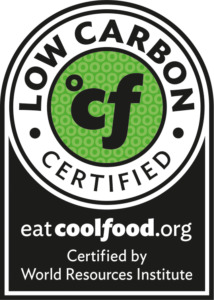 Coolfood has improved its menu certification label to make it easier for food providers to use and engage with customers. We made changes based on an extensive review of what consumers are looking for in menu labels, how to create transparency on what constitutes a low-carbon meal, and ways that a refreshed look could promote trust and credibility with diners. Most recently, ISS announced it is bringing the Coolfood label to 11 secondary school menus in the United Kingdom.
Coolfood has improved its menu certification label to make it easier for food providers to use and engage with customers. We made changes based on an extensive review of what consumers are looking for in menu labels, how to create transparency on what constitutes a low-carbon meal, and ways that a refreshed look could promote trust and credibility with diners. Most recently, ISS announced it is bringing the Coolfood label to 11 secondary school menus in the United Kingdom.
Today, Coolfood’s menu certification mark appears on more than 6,000 meals served by Aramark in the United States and Canada; the University of Maryland in the United States; ISS in the United Kingdom; and JDE’s OldTown Café in Malaysia.
What’s On Your Plate in 2025?
Coolfood works with all types of food providers – from large, global contract catering companies to grade-school cafeterias. We’re helping ensure the entire food service industry can reduce its emissions and promote healthy, sustainable diets that benefit people and nature. Here are a few of the questions we help food providers solve:
- What targets should I set for my food-related GHG emissions?
- How should I measure my food-related emissions or other environmental impacts?
- How can I best collect and measure data?
- How do I identify which of my food purchases have the greatest environmental impact?
- How can I model emissions reduction opportunities?
- What are the best levers to shift consumers to a more plant-rich diet?
We’d love to talk with you. Reach out today to get the conversation going by sending an email to coolfood@wri.org.
